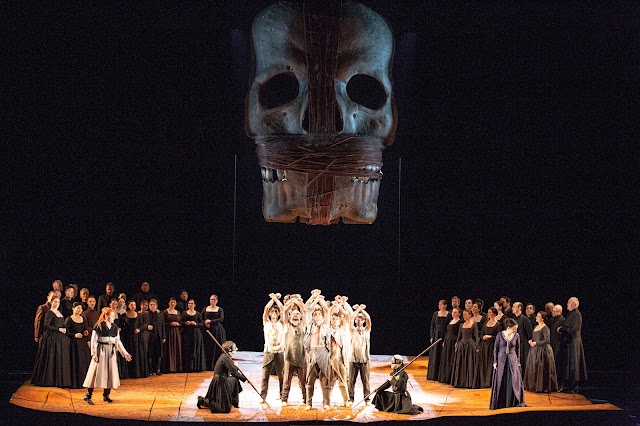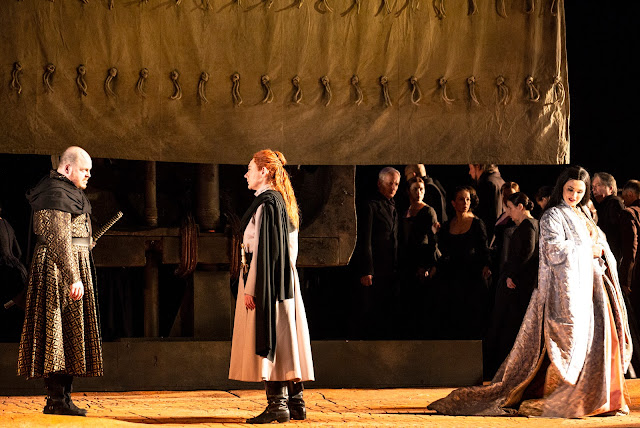Idomeneo – Andrew Staples
Idamante – Magdalena Kožená
Ilia – Anna Prohaska
Elettra – Olga Peretyatko
Arbace – Linard Vrielink
High Priest of Neptune – Florian Hoffmann
Oracle – Jan Martiník
Cretans, Trojans – Marie Sofie Jacob, Ekaterina Chayka-Rubinstein, Johan Krogius, Friedrich Hamel
Caroline Staunton, Colm Seery (assistant directors)
Vicki Mortimer (set designs)
Gabrielle Dalton (costumes)
Paule Constable (lighting)
Colm Seery (choreography)
Benjamin Wäntig, Elisabeth Kühne (dramaturgy)
Movement Group
 |
| Images: Bernd Uhlig |
David McVicar’s disdain for theatre that might lie more on the critical-ideological side is well known and well documented. This fawning newspaper interview is doubtless not his fault; the journalist clearly knows nothing about opera and seems more interested in admiring and detailing his physique: ‘I'm distracted by the arms. They are bursting out of a tight T-shirt full of artful rips. They're the kind of arms that have you thinking of Glasgow shipyards, or perhaps gay nightclubs. They're not the kind of arms that have you thinking of arias.’ Much to unpack there, in the unlikely event one is particularly interested in reasons for the interviewer’s ‘distraction’. We nonetheless proceed to read the interviewee roundly disparage German theatre: ‘“There'll be combat physiques,” he says, “and balaclava helmets, and machine guns, and there'll be neon strip-lighting, and everything will be antiseptic and everyone will over-react madly and the audience will sit there, taking it all incredibly seriously, and I'll be sitting there stuffing my fist in my mouth, because I'm trying so hard not to laugh.”’ It is perhaps not surprising then, that Germany has not proved a typical base for the director’s career, and it did come as a surprise to see him listed to stage Idomeneo for the Berlin State Opera back in 2020, just before the world ground to a halt. That never happened, of course, though rehearsals took place. McVicar’s Berlin Idomeneo has finally seen the light of day three years later, in a house that has seen its fair share of changes in the meantime, not least the retirement of its long-term music director, Daniel Barenboim.
Barenboim, always surprisingly selective in the Mozart opera he conducted – the Da Ponte operas, and long ago, never to be repeated, The Magic Flute – was not due to conduct. A very different kind of Mozartian from Barenboim, Simon Rattle, was—and did three years later. It is probably the Mozart opera with which Rattle is most strongly associated, having conducted at least two staged productions previously (at Glyndebourne) as well as giving it in concert. The length of his association with the work shows; one can see as well as hear that he knows it intimately. Sometimes that can be a danger with Rattle in classical and romantic repertoire; he can seem eager to impose ideas on music, disregarding its line as if for the sake of doing something new. Whilst there was a degree of moulding the score, certainly in ways one would never have heard from Karl Böhm or Colin Davis, they were not disruptive and, crucially, always bore a rationale. I may not always have liked the post-Harnoncourt rhetoric, but Rattle’s job – theatre’s job – is not necessarily to provide me with what I like. I tried to approach it on its own terms, and found a generous way with the music, especially convincing in the transitions, of which here there are many, between recitative, arioso, and arias, ensembles, and choruses. Rattle’s experience, highly unusual for a conductor of his standing, in music of the French Baroque stood him in excellent stead here; this was worlds away from the metronomic stiffness of many English, ‘period’-inclined conductors. There were times, I admit, when a stronger sense of direction, less lingering, would not have gone amiss; the third act, even shorn of its ballet music, sounded somewhat sprawling. Yet Rattle’s concern for detail, surely admirable in itself, never extended to losing the word for the trees.
It was fascinating, moreover, to hear the Staatskapelle Berlin respond to a way with Mozart so different from Barenboim’s. If the strings sometimes sounded as if they might have appreciated being let loose more – and not only concerning vibrato – they were nonetheless willing, perhaps even happy, to follow different thinking, as they will need to in the post-Barenboim era (whether listeners such as yours truly like it or not). The timpanist seemed delighted by the opportunity to use hard sticks, underlining and punctuating the action with great flair. If I cannot say I cared for the rasping sound demanded from the trumpets, the orchestra’s woodwind sounded simply ravishing, Rattle’s keen, somewhat ‘French’ ear for colour liberating them as soloists (and ensemble players with the cast). For all the difference between Barenboim and Rattle, that is certainly a characteristic they hold in common—and one to which no one is likely to object. Colourless Mozart would be a peculiar goal indeed.
Singing was generally excellent. Magdalena Kožená also has a long history with this work, not least with Rattle. She seemed very much in her element here as Idamante, as stylish as she was characterful and committed. Her chemistry with Anna Prohaska’s Ilia was notable, that chemistry as musical as it was gestural, their lines entwining (with or without woodwind) as if twin coloured strands in a fine tapestry. Prohaska’s performance offered a near-perfect balance between words, musical line, and stage presence. A few strange vowels notwithstanding – and goodness knows what much ‘Western’ singing of Russian roles must sound like to native ears -- Olga Peretyatko’s Elettra fizzed with musico-dramatic commitment, only hamstrung by McVicar’s production (to which, of course, I must shortly return). In possession of both his arias, Linard Vrielink’s Arbace had ample room to impress and to rise above the generic assumptions that often underlie this role; this opportunity he took wholeheartedly, sharing with most of the cast a keen understanding of the dramatic role of coloratura. Andrew Staples, a Rattle favourite, did not always seem ideally suited to the title role. One need not go full-Pavarotti, to feel something a little more Italianate is ideal here. However, so long as one could take a more English sound – Peter Pears sang the role for Britten – one was rewarded by a detailed and conscientious performance.
What, then, of McVicar’s production? It has a few important, related ideas going for it, namely that of the end of Idomeneo’s rule – ‘regime change’ if you will, in line with Martin Kušej’s largely misunderstood production for Covent Garden – and that of love, in this case between Idamante and Ilia, conquering all. Both have eminent warrant in the work, indeed are arguably embedded within it. It is the classical dilemma of AMOR versus ROMA. The sinister role played by Arbace as chief ideologue is worth noting; indeed character and role are surely rendered sinister with an interventionism McVicar has decried elsewhere. At the close, Idamante and Ilia seem unaware of anything but each other, enabling Arbace to dispose, for reasons presumably of religion and state, of the former king as surplus to requirements. By the time Idamante realises, it is too late. Life, and Crete, must go on.
I just wish there had been more of this—or of something, almost anything. Elsewhere, McVicar seems so reluctant to ‘say’ anything, that it makes for a strangely inert dramatic experience. Dancers, as so often in his staging, do their thing, yet to what end is at best unclear. Portrayal of the sea monster on stage is, admittedly, a tricky thing at best; some may have been more convinced by graceful waving around of hands than I was. Nods to Japanese Noh, often concerning Elettra and her attendants, might have led somewhere, yet seem strangely unconnected with a highly ‘traditional’ everything else. Indeed, they come uncomfortably close to suggesting all-purpose orientalism. There are no combat physiques, machine guns, neon strip-lighting, and the rest, but there is not much of anything else either. For a new production, bar its strong finish, it seems a curiously wasted opportunity that often borders on the tedious. Musical performances more consistently had one think about as well as enjoy them.‘
